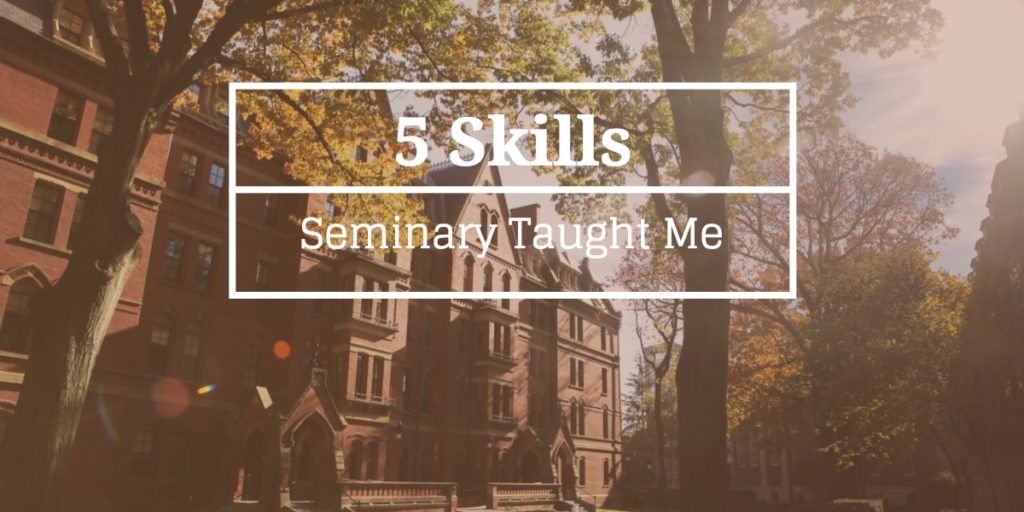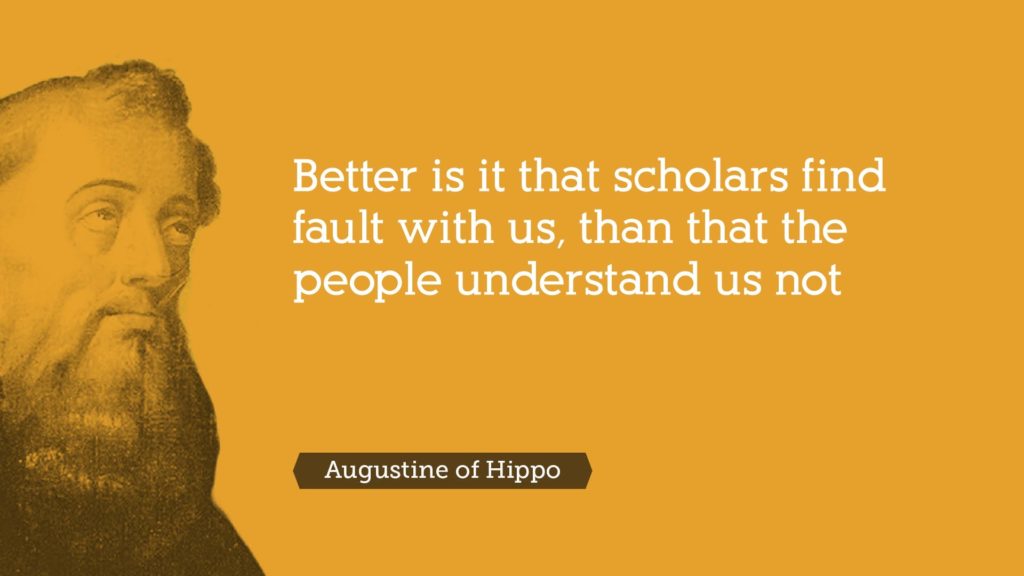In 2013 I set out to earn a second Master’s Degree. I had just completed a Master of Science in Organizational Psychology and was faced with an opportunity to earn a Masters Degree in Biblical and Theological Studies from Knox Theological Seminary. The offer was too good to pass up and I love being a student so I embarked on a 2.5 year journey. Recently, I finished all course requirements and finished my degree. As I’ve been reflecting on my time in Seminary I’ve come to realize that much of what I learned and will take away with me are the intangibles. There are specific benefits of seminary that are unexpected. The following are five of the most important skills that Seminary taught me aside from the standard academic goals of proficiency and aptitude in the area of theological and biblical studies.

Pursuing Excellence in the Area of Time/Calendar Management:
Throughout my seminary journey I balanced a full time job at Faithlife which had me traveling over 100K miles a year around the world. I did my best to be a faithful husband and loving father to my three sons. I also attempted to be apart of the local church and serve to the best of my ability. Somewhere in that mix was serious study time for seminary which included lots of reading and writing. Oh, I also had to fit in fantasy football and watching and playing basketball! I’ve been constantly asked, “How do you manage it all”. I typically responded with, “It’s really just the way God wired me”. As I reflect on that season of my life I agree that God has definitely wired me in a way to enjoy balancing multiple projects, however; I think an overlooked skill that was forcibly developed was pursuing excellence in my time and calendar management. The most important part of this for me was redeeming possibly wasted time. For instance:
Get all my reading and as much of my writing done during airplane rides instead of falling asleep (which sadly I did to often!).
Create blocks of time that was dedicated to school, work, family, and fun/activities. I built this in my iCal and shared it with my wife so we had visibility in my schedule.
Evaluate my calendar and how successful I had been the previous week – I learned quickly how much I could manage and had to make some difficult decisions in different seasons on things that I had to lay down in order to get my priorities done. For instance, I took a 4 month break on this blog to finish seminary strong and achieve the grade point average I needed to have a competitive application for a PhD program
Ultimately, this allowed me to finish my goals without having to many things slip. If they did slip, it would be taken care of in the evaluation of my previous week. Learning this has been vital and really has overflowed into every area of my life.
Think Critically about Literature and Scripture:
Until I got into Seminary I didn’t realize how much of my reading was on auto pilot. I took almost everything I read to be fact without really engaging and thinking critically about what was being said, why it was being said in that way, and if I even agreed with what was written. This showed up specifically in engaging with commentaries, modern surveys, and biographical research and study on influential people such as Jonathan Edwards, John Calvin, and Augustine. It is easy to just assume what they have to say is correct because of the great platform they have in the development of theology and doctrine. However, I was forced to come to terms with parts of their writings I didn’t agree with or where they missed the point or were simply negligent in. This is not isolated just to writing but the life that was lived. For instance, for all the good that Edwards has done for the church the fact is he was also a slave owner. Some how in his study, this was a blind area of his life.
Thinking critically about literature and scripture caused my mind to work in ways that it hadn’t previously. I found my self asking different questions which led me to a deeper and better understanding of scripture and theology.
Funnel my Scholarly Pursuit Through the Lens of Ministry:
One of my honest fears of Seminary was that I would turn into a snobbish academic elitist with little time for ministry and people. I didn’t want to become a modern Pharisee who was so caught up in the details of the scripture that I missed the heart and mission of God. This fear actually served as a lens that I funneled my academic pursuits through. I made it a habit of asking the simple questions, “How and why would this relate to my church or the body of Christ?”. Crossing the bridge of application between the scholarly and ministry worlds is so important. I think its when we neglect this bridge that we lose our way. Again, I am greatly influenced by Augustine who spent 35 years as Bishop of Hippo preaching up to two times a day and still accomplished academic excellence. It took Augustine 16 years to write his influential work on the Trinity in his “spare time”! Possibly my favorite Augustine quote is:
Better is it that scholars find fault with us, than that the people understand us not.

Being an Academic and Still Have a Relationship with Christ:
Another fear going into seminary was that my heart would turn cold towards God and that the scriptures would become a textbook filled with information that needed to be studied and researched. Again, this fear propelled me to engage with the Lord personally through seminary. I made a commitment to read books that were more devotional in nature and caused me to realign my heart with the creator of the universe. Dr. John Piper’s Desiring God was monumental for me in seasons where I felt myself slipping.
While this is a serious danger, especially as I consider further academic pursuits; I am encouraged that there are those out there that have also been down that road and are more in love with Christ than ever before as a result of their academic journey.
Being a Perpetual Student of the Word of God: There is no “Arriving”
Just because you graduate with a diploma and have the ability to add a few letters after your signature doesn’t mean you have “arrived”. Throughout my entire seminary process what became more and more evident is how little I am and how much there is to learn and grow in. This goes for both the academic and spiritual parts of our life. We will ever be servants of Christ and it bodes us well to position our selves in humility before the creator of the universe. That he reveals himself to us through his Word is evidence of his grace and love for the people whom He created. This sense of humility allows us to approach the scriptures with an eager mind and humble heart.
COMMENTS: